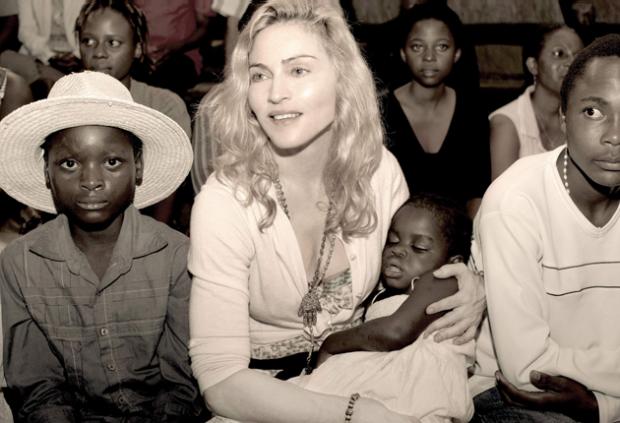June 12, 2009 // Malawians welcome the court's decision to allow Madonna to adopt Chifundo "Mercy" James.

Madonna has succeeded in her bid to adopt a second African child after Malawi's Supreme Court told a provincial judge that she had listened too much to media reports and overturned her earlier decision. The 50-year-old single mother from New York, as Madonna was identified on a notice outside the court, completed her three-year pursuit of Mercy James Chifundo as a panel of judges paid tribute to her compassion for Malawian orphans.
"We find the judge in the lower court to have dwelled so much on media reports on the issue of residence and to us this was not evidence enough to deny Madonna a chance to adopt Mercy James," said Chief Justice Lovemore Munlo, reading an hour-long judgment in Malawi's second city of Blantyre. "We therefore grant Madonna the adoption order."
The singer, who chose not to attend the hearing, was told the news in New York by her lawyer Alan Chinula, who said she was "very excited". He stressed that the matter was now finalised, "as her lawyer I am happy that this has settled this contentious issue".
The singer's adoption spree in one of Africa's poorest countries has been attacked both by local and international aid agencies and rights groups who say it violates international child welfare and adoption rights.
Four-year-old Mercy will now join David Banda, another Malawian child adopted by Madonna in 2006, when he was 13 months old.
In yesterday's ruling, the court appeared to chastise the provincial justice, Esimie Chombo, who warned in April that special exemptions for celebrity adoptions risked opening the door to child trafficking in the future. Justice Chombo blocked the adoption on the grounds that the American star was not a Malawian resident, but this argument was dismissed by the higher court yesterday.
"In this global village a man can have more than one place at which he resides. The matter of residence should be determined at the time of application of the adoption," Justice Munlo told the court.
The ruling waived the issue of residency, arguing that Madonna's investment in the country qualifies her as a resident. The divorced performer has set up a charity, Raising Malawi, which assists in the care of some of the country's estimated one million orphans. Malawi, a long strip of land on the western shore of Lake Malawi, has been ravaged by HIV/Aids and has one of the lowest life expectancies in the world, at just 40.
Mercy was identified from pictures taken of children in Malawian orphanages in 2006 by Madonna's then husband Guy Ritchie.
Her original attempt to adopt the child was blocked, it is claimed, by Mercy's maternal grandmother, Lucy. The second effort was then halted over the residency issue but yesterday's decision was "final" according to authorities. Much of the controversy surrounding the adoption stems from the fact that Mercy is not an orphan. Her teenage mother, Mwandide Maunde, died from complications after giving birth but her father, James Kambewa, is still alive.
Mr Kambewa, who lives and works in a Blantyre slum, admits that he has never seen his daughter but said recently that he opposed the adoption.
Daniel Howden: Broken families need real help
Comment
The problem with the rich and famous shopping for "orphans" is that it distracts attention from real solutions.
Fidel, who is thought to be 18 months old (his older brother doesn't know for sure how old they are or if they're orphans), is not being sought by recording artists and really needs help. He was found in a cell at the children's court by Juliet John, a British volunteer with a feeding programme for young offenders in the Kenyan capital, Nairobi, run by a slum charity, the Mathare Youth Sports Association (Mysa), which seeks to reunite these lost boys and girls with family members. "When they were picked up by police they had swollen bellies," said Ms John. "They were brought here because there was nowhere else for them." Mysa volunteers talk to the children to seek clues about where they come from and then try to track down their families.
"We try to get relatives to take responsibility for them," said Peter Karengo, who runs the programme. "Helping to mend these broken families is the best way to help the children."
This is the kind of unheralded work that will help the millions of African children for whom there is no private jet out of poverty.
Your Independent
Comments
Post a Comment